
Ludovico De Luigi (born 11 November 1933) is a contemporary Italian sculptor and painter born and living in Venice, Italy.

Ludovico De Luigi (born 11 November 1933) is a contemporary Italian sculptor and painter born and living in Venice, Italy.
De Luigi's first exhibition was in 1965 with his one-man show at the Gallery "Il Canale" in Venice which included two large works, views of a decaying and monumental Venice invaded by waves of insects and fantastical beings. Upon meeting with the gallery owner Luciano Ravagnan in 1968, De Luigi's exhibition activity increased in Venice and abroad. There were exhibitions in Trieste, Milan, New York, Munich, Monte Carlo, Paris and, beginning in 1975, in many German cities.
Alongside works with themes of Vedutism and entomology, he depicted threats which menace Venice: flood water, pollution, technology, and consumerism. Venice is represented in surreal visions, catastrophic, sensual or decadent, using an oil technique; the "electronic brush" of the computer is used later.
In the 1980s De Luigi produced sculptures, including enormous bronze horses inspired by the famous Triumphal Quadriga of St Mark's Basilica. De Luigi's horses are now in the squares of Marseille, St. Louis, Chicago, Denver, Perth and Bolzano. As of 2004, two of the horses were installed in the lobby of the Adam's Mark hotel in Saint Louis. [1] For the Venice Carnival of 1990 he created a huge chocolate horse of the same dimensions. In 1999 he sculpted one in Murano glass.
1965
1966
1967
1968
1969
1970
1971
1973
1974
1975
1976
1978
1979
1980
1982
1983
1984
1985
1986
1987
1988
1989
1990
1994
1995
1996
1997
1998
1999
2002
2004
2005
2006
2007
2013
Museums of modern art listed alphabetically by country.

Luigi De Giudici was an Italian painter of the Venetian anti-academic movement in the first years of the twentieth century. His works were exhibited at Ca' Pesaro between 1912 and 1920 and at the International Exposition of Paris (1937).
Franca Batich is an Italian contemporary artist who specializes in oil and mixed technique abstract painting.

Ettore Tito was an Italian artist particularly known for his paintings of contemporary life and landscapes in Venice and the surrounding region. He trained at the Accademia di Belle Arti in Venice and from 1894 to 1927 was the Professor of Painting there. Tito exhibited widely and was awarded the Grand Prize in painting at the 1915 Panama–Pacific International Exposition in San Francisco. In 1926 he was made a member of the Royal Academy of Italy. Tito was born in Castellammare di Stabia in the province of Naples and died in Venice, the city which was his home for most of his life.

Ketty La Rocca was an Italian artist during the 1960s and 70s. She was a leading exponent of body art and visual poetry movements.

Eugenio Da Venezia was an Italian painter. He was a member of the group known as I Giovani di Palazzo Carminati. This group rejected the prevailing style of the Italian Academy at the beginning of the 20th century. Da Venezia painted in a post-impressionist style, influenced by the Venetian tradition of the vedutisti. He exhibited in ten editions of Venice Biennale between 1934 and 1956, including the XL anniversary in 1935.
Paolo Canevari is an Italian contemporary artist. He lives and works in New York City. Canevari presents highly recognizable, commonplace symbols in order to comment on such concept as religion, the urban myths of happiness or the major principles behind creation and destruction.

Carla Accardi was an Italian abstract painter associated with the Arte Informel and Arte Povera movements, and a founding member of the Italian art groups Forma (1947) and Continuità (1961).
Antonio Bueno was an Italian painter of Spanish origin, who acquired Italian citizenship in 1970. He was born in Berlin while his journalist father was posted there by the newspaper ABC of Madrid.
Armando Pizzinato was an Italian painter.
Sergio Zanni is an Italian painter and sculptor. After obtaining the Diploma at the Institute of Arts 'Dosso Dossi' in Ferrara, Italy, he graduated from the Academy of Arts in Bologna. He taught in the Institute of Arts 'Dosso Dossi' until 1995. For his research in sculpturing he utilized backed clay and, successively, lighter material for sculptures of large dimensions.
Marina Apollonio is an Italian painter and optical artist. She lives and works in Padua.

Giuseppe Amisani was an Italian portrait painter of the Belle Époque.

Maurizio Nannucci is an Italian contemporary artist. Lives and works in Florence and South Baden, Germany. Nannucci's work includes: photography, video, neon installations, sound installation, artist's books, and editions. Since the mid-sixties he is a protagonist of international artistic experimentation in Concrete Poetry and Conceptual Art.

Sergio Ceccotti is an Italian painter. He lives and works in Rome.

Paolo De Grandis is an Italian contemporary art curator and president of PDG Arte Communications. He lives currently in Venice.

Mauro Modin is an Italian painter. His work is tightly bound with and contaminated by music, in particular Jazz.

Yumi Karasumaru is a Japanese artist. She lives and works in Bologna, Italy, and Kawanishi, Japan.
Albino Lucatello was a modern Italian painter.